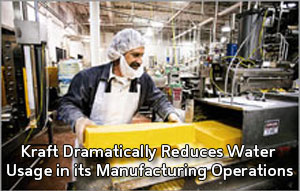While most of the focus on “Green Supply Chains” has been around CO2 emissions and energy/fuel usage, water conservation is increasingly part of the overall Sustainability mix.
Food giant Kraft has certainly embraced that view, and in 2005 started an ambitious goal to reduce its water usage – key to most food manufacturing processes - by 20% by 2010.
This week, the company announced it had achieved its goal two years early, decreasing water consumption by 21% by the end of 2008. That translates into some 3 billion gallons.
"We're changing behavior and getting results," said Steve Yucknut, Vice President, Sustainability at Kraft. "Around the world, thousands of our employees are working on projects that help us reduce our environmental impact. We focus on manufacturing, since that's where we use the most water for internal operations. And we pay particular attention to water-scarce areas, where the need is greatest."
Examples of water reduction initiatives cited by the company include:
- A Jacksonville, FL coffee plant installed a closed-loop system to reuse water to cool coffee grinding equipment instead of using city water, helping it reduce water use by more than 35 percent (nearly 20 million gallons/75 million liters).
- Atlanta Bakery reduced water use by 33 percent (nearly 17 million gallons/64 million liters) as employees reduced the amount of water used for cleaning specific equipment and also eliminated unnecessary re-cleaning of equipment. They also changed cleaning procedures to begin cleaning before using water and repaired leaks at the facility.
- A food plant in Champaign, IL grocery reduced water use by nearly 20 percent (nearly 120 million gallons/450 million liters). Employees raised awareness about ways to reduce water use, fixed leaks and outfitted plant boilers and evaporating equipment to reuse well water instead of the town's water.
- A plant in Port Melbourne, Australia recently won a prominent environmental award for identifying opportunities and taking actions to reduce potable water use up to 39 percent (20 million gallons/74 million liters per year). The project will reuse production process water and optimize clean-in-place systems for manufacturing equipment.
 A cheese and beverage plant in Bahrain reduced water use by 33 percent (5 million gallons/18 million liters per year) by using alternative options to enhance the effectiveness of cleaning without compromising product quality. Now, product lines can run longer without interruption. A cheese and beverage plant in Bahrain reduced water use by 33 percent (5 million gallons/18 million liters per year) by using alternative options to enhance the effectiveness of cleaning without compromising product quality. Now, product lines can run longer without interruption.
- A cheese plant in Fallingbostel, Germany plant reduced water use by 7 percent (18.5 million gallons/70 million liters per year). The plant is now reusing its manufacturing process water -- instead of using the town's water -- to run the plant's cooling towers.
“Kraft didn’t release numbers on the financial impact, but on the surface, these look like relatively low cost efforts that should have a strong ROI in addition to being environmentally friendly,” says SCDigest editor Dan Gilmore.
What are your views of Kraft’s efforts with water? Do many companies have similar types of opportunities? What is the right way to get started? Let us know your thoughts at the Feedback button below.
|